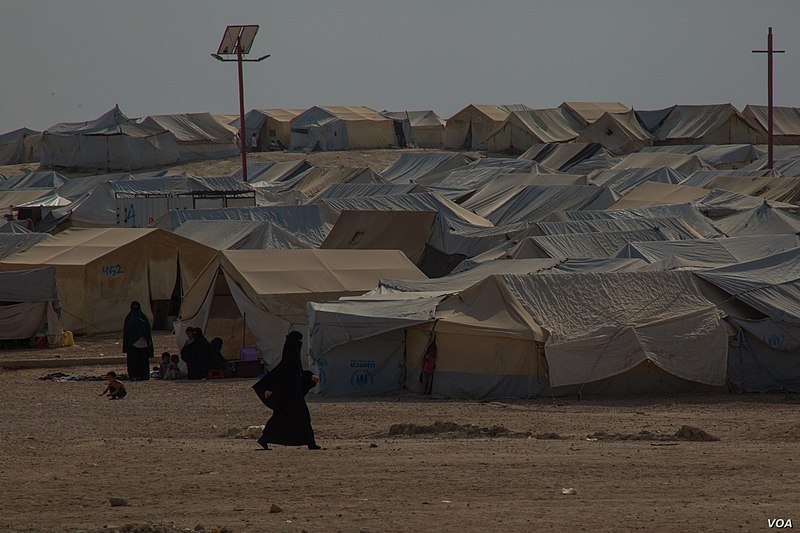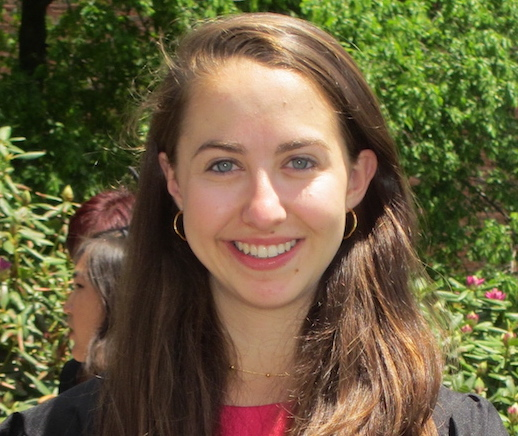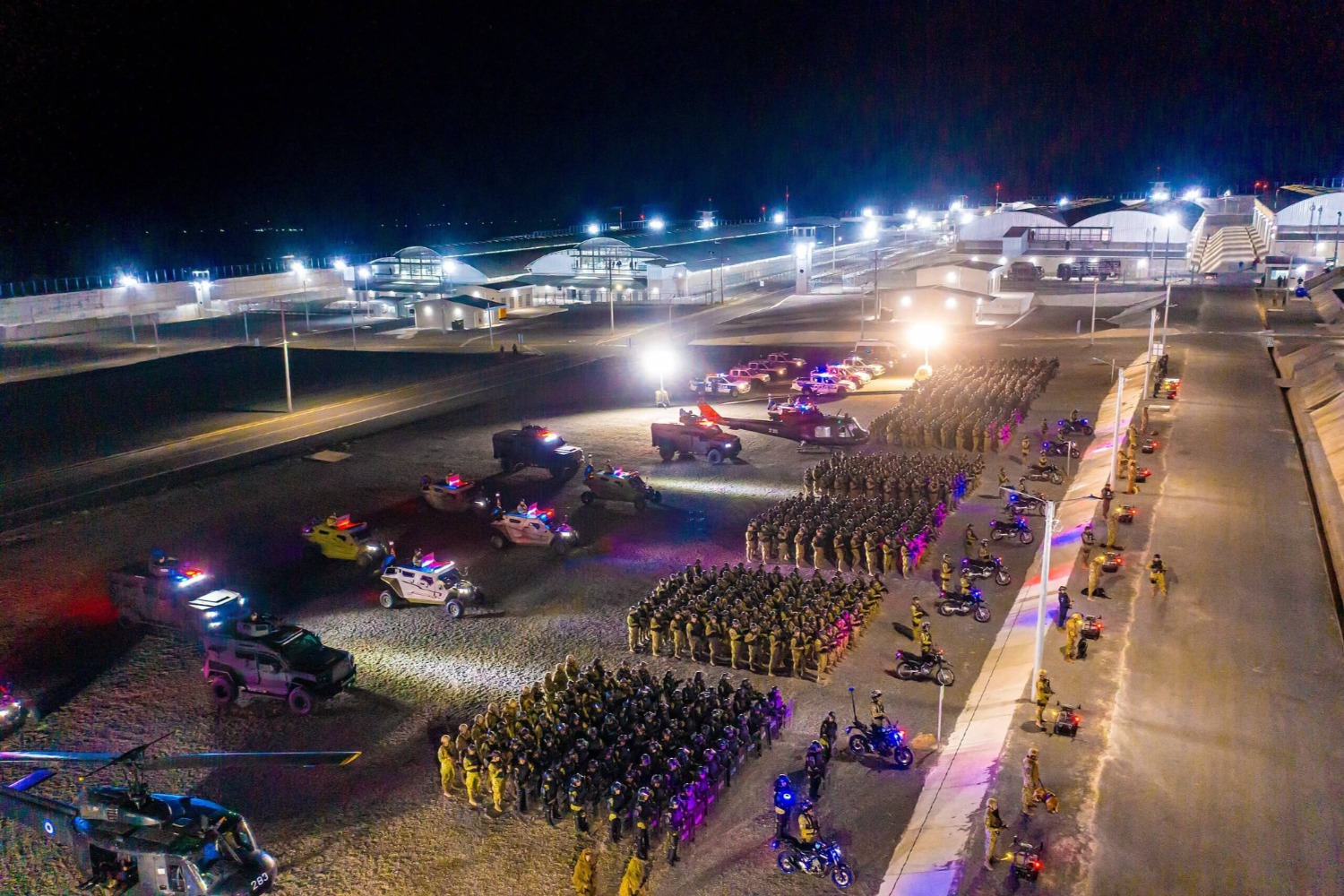What Is Happening With the Foreign Women and Children in SDF Custody in Syria?
More than 10,000 European women and children affiliated with Islamic State fighters remain in local custody in northeastern Syria. So far, European governments have been reluctant to take large-scale action.

Published by The Lawfare Institute
in Cooperation With

British-born Shamina Begum is a U.K. citizen no more. In February 2019, the British government stripped citizenship from Begum, who fled for Syria at age 15 to join the Islamic State.
The U.K. Special Immigration Appeals Commission (SIAC) denied Shamima Begum’s appeal of the government’s decision on Feb. 7. (According to the BBC, the SIAC is a “semi-secret court that deals with cases where the UK government wants to keep someone out of the country on national security grounds.”) Begum cannot return to the U.K. and—contrary to claims made by the British government—most likely cannot claim Bangladeshi citizenship. So, she will be indefinitely detained in a camp in northeastern Syria.
Yes, Begum once endorsed the Islamic State’s violent treatment of Western journalists and has a history of comments that reflect continued sympathy for the group. But the British government’s decision may effectively leave Begum stateless. In fact, the SIAC itself acknowledges that the conditions in the camp amount to cruel, inhuman and degrading treatment under international law. Yet it still holds that the British government has no responsibility for the conditions of Begum’s detention in Syria.
Begum’s case underscores the challenges of resolving the problem that European governments are currently facing with alleged Islamic State fighters and their families still detained in Syria.
Local authorities in northeastern Syria have a plan that could (at least temporarily) relieve Europeans of the foreign fighter problem. The authority affiliated with the Syrian Democratic Forces (SDF) proposed in February that it would begin trying foreign fighters in local administration courts. At this stage, it’s unclear whether the proposal will have any legs. But either way, it will not solve the other aspect of the problem: the relatives of the fighters—thousands of women and children—currently living in makeshift camps across northern Syria.
Figures from November 2019 indicate that there are about 13,500 foreigners (women and children) dispersed across three makeshift camps controlled by the SDF—Al-Hol, Roj and (until recently) Ein Issa. As of January, Al-Hol, the largest of these camps, housed about 10,000 of these foreigners (a cohort that represents only about 15 percent of the camp’s total population of about 66,000 people) in an annex of the camp reported to have particularly appalling conditions.
European governments have generally treated their women and children citizens who fled to Syria to join the Islamic State differently from the men who made the same journey. While European governments have been either noncommital on the subject of repatriating male foreign fighters or affirmatively against the idea, they have been slightly more willing to discuss the issue of women and children. Governments have expressed a variety of concerns about repatriating women and children but tend to support some returns, especially in the case of orphan children.
Over the past year, Kosovo repatriated 74 children; France, 17; Sweden, 7; Belgium, 6; and Norway, 5. A handful of orphans have also been repatriated by Germany, Austria, the Netherlands, the U.K., Finland and Denmark.
These returns show that repatriations are logistically possible, but governments have avoided generalizing these practices to all the women and children who remain in the camps in Syria. Rather, most European governments have adopted one of the following two policies: repatriating children by request on a case-by-case basis (as France and Germany have done) or repatriating only unaccompanied children (as the U.K. has done). And most governments have tried to reject any women who want to return, explaining that they have no obligation to assist the adults who traveled to the region voluntarily or arguing that they need not provide consular access. In extreme cases, like that of Begum, they have stripped citizenship from these women.
In a few instances, governments have tried to adopt a proactive approach to the repatriation of children that would entail more generalized repatriation of children. But these efforts have faced internal resistance and logistical challenges. Finland, for instance, devised a plan to repatriate the 30 children of Finnish mothers living in Al-Hol. The plan was squashed by the parliament’s Constitutional Committee, which prevented the government from moving forward by asking the prosecutor general to investigate the legality of the foreign minister’s actions during his push to repatriate. While the case is unlikely to end up in court, the decision to repatriate may still cause tensions within the already fragile governing coalition. Meanwhile, Norway’s governing coalition already collapsed over this issue in January after the government decided to repatriate a Norwegian woman and her two children from Syria, one of whom required urgent medical care. In protest, the right-wing Progress Party withdrew its ministers from the governing coalition, collapsing the government. Most recently, Belgium’s minister of foreign affairs announced that his country is trying to repatriate the 42 Belgian children under 10 years of age in northern Syria. However, he expressed concern about the challenges that still lay ahead to facilitate the repatriations, including getting consent from their still-detained mothers who will not be allowed to return to Belgium.
The Women Who Have Returned
Some of the women who have already returned, largely via deportation from Turkey, have been arrested upon arrival and prosecuted for their involvement with the Islamic State. Although past female returnees have been charged with war crimes or crimes against humanity, those who have returned to the continent more recently have faced primarily terrorism association charges. These charges carry relatively light sentences, and the women tend to face five to 10 years in prison.
In January, the Norwegian woman whose case ultimately triggered the collapse of the governing coalition was immediately arrested upon her return and charged with participation in a terrorist organization. The charge is punishable by up to six years in prison in Norway.
In Ireland, Lisa Marie Smith was also charged with membership in a terrorist organization. Smith, a former member of the Irish Defense Forces, allegedly traveled to Syria in 2015 to join the Islamic State. She was living in the Ein Issa camp until she was detained by Turkish forces during their October 2019 incursion in northeastern Syria. In December 2019, Smith was deported by Turkey, with the cooperation of the Irish government. She was arrested upon arrival at the Dublin airport. Interestingly, in contrast to other European governments, Dublin acknowledged that it had a responsibility to facilitate the return of Smith and her daughter and agreed to assist in the repatriation. Smith is currently released on bail before her next hearing. Other women who were deported around the same time by Turkey to France, Germany and the Netherlands were also arrested upon arrival and charged with participating in a terrorist organization.
In November 2019, a French court convicted and sentenced Anne Diana Clain—whose two brothers were notorious supporters and propagandists of the Islamic State—to nine years imprisonment for association with a terrorist organization and attempts to join the Islamic State. The court also found Clain’s husband, Tunisian national Mohamed Amri, guilty on the same charges and sentenced him to 10 years. The couple were arrested while trying to cross the border from Turkey into Syria to join the Islamic State with their four children in July 2016. Clain claimed that the couple had merely been attempting to visit her family in Syria and has asserted that she has renounced any beliefs in support of the Islamic State.
Legal Challenges to Government Inaction
Some European women in Syria or relatives of those detained have challenged the inaction of their governments to repatriate women and children in the courts. These challenges have received varying responses. While one German court has favored the applicants seeking repatriation, Belgian courts have issued mixed rulings, and Dutch and French courts have sided with the government. Since most governments have expressed a willingness to repatriate children even without a mandate from a court, these decisions are particularly significant for the European women detained in Syria.
At least two courts in Belgium, in October and December 2019, respectively, ruled in favor of repatriating the women and children who brought the cases. Both courts agreed with the plaintiffs’ arguments that the government was neglecting its obligation to its citizens under international human rights law and ordered the government to repatriate the families within a certain number of days or pay damages for each day of delay. Before these rulings, the government was already prepared to allow the children to return, but it had not proactively facilitated their returns and had been opaque on what it would do with the mothers. The government appealed the decision in both cases and recently won the appeal in at least one. In the case from December, the court of appeals in Brussels overturned the lower court’s decision and held that Belgium cannot be obliged to act for its nationals within a detention camp abroad that is being managed by the SDF. The status of the October case is unclear. In another December case, which involved four Belgian women and their children, a court in Brussels issued a slightly different ruling: The government must facilitate the return of the 10 relevant children but does not have to give the same assistance to their mothers. These children have yet to return to Belgium, and the four women appealed the part of the decision that denied them assistance.
In November 2019, a higher administrative court in Berlin affirmed a lower court ruling that the government had to repatriate three German children along with their German mother. The case began in May 2019, when the mother and her children applied to the administrative court in Berlin to force the German government to grant them consular protection. This would include the German government issuing them travel documents and repatriating them to Germany. Like the Belgian government, Germany had already been planning to assist these children, but it had refused to repatriate the mother as a result of national security and foreign policy concerns.
In affirming the lower court’s judgment, the higher court explained that the state has a duty to protect its citizens based on Article 1 (human dignity, human rights and legally binding force of basic rights) and Article 2 (personal freedoms) of the Basic Law of Germany. The court reasoned that this duty means that Germany has an obligation to protect the children from the dangerous conditions in the camp in Syria; and since children cannot be separated from their mothers—according to both Kurdish and German policies—the government would also have to repatriate the children’s mother.
The German court also noted that the government failed to show any evidence of a concrete or tangible security threat. The court asserted that the government could not just rely on a general argument about the potential dangers related to the return of Islamic State fighters when negotiating specific cases like this one. Finally, the court explained that the German government had repatriated other children recently, so it could not point to logistical concerns as a justification for its refusal to repatriate. The ruling has important implications for the women who levied the suit. But, so far, it does not seem as if German courts have seen a flood of challenges from similarly situated women. It’s unclear why this is the case, but a lack of resources and adequate counsel could be to blame.
Meanwhile, women and children from the Netherlands and France have had less luck in court than their German or Belgian counterparts. On Nov. 22, 2019, an appeals court in The Hague overturned a lower court’s opinion that ruled in favor of the repatriation of 56 Dutch children and 23 women who joined the Islamic State. The lawyers representing the families in Syria argued that the situation in the camp is so dire that it violates fundamental rights under both Dutch and international law, including the right to life and the prohibition of inhuman treatment. As such, the lower court held that by refusing to repatriate these women and children, the Dutch government is violating a collection of obligations: the applicable human rights conventions (specifically the European Convention on Human Rights and the Convention on the Rights of the Child), the right to consular assistance, and the government’s duty of care as set out by Article 6: 162 of the Dutch Civil Code.
The Dutch government argued to the appellate court that its decision not to repatriate was based on national security and foreign policy concerns—areas where the government maintains broad discretion. The government reasoned that in these circumstances, the court should use a balancing test to determine if the government’s decision is reasonable: The greater the interests invoked by the government, the more deferential the court should be toward the government’s decision. In both oral and written judgments, the appellate court accepted the government’s argument. In applying the deferential test, the appellate court determined that the government had significant security and policy interests in this case, so the politicians—not the judges— should be making the ultimate decisions about repatriation. The higher court thus concluded that the state was not legally required to assist in the repatriation of either the children or the mothers in Syria.
So far, like the Dutch, French courts have also resolved disputes over repatriation in favor of the government. However, that might change with a new case that has been filed against a government official. Last year, the families of several children and wives of French fighters detained in Syria filed a suit against the minister of foreign affairs in a court that hears cases of alleged misconduct by ministers. The complaint is brought on the grounds that the minister failed to provide assistance to these citizens or let them return to France. A similar suit was filed at the European Court of Human Rights in May 2019 by the grandparents of two French children stranded in Syria.
Complicated Decisions With Consequences
The decision about what to do with the women and children in Syria is often more complicated than the decision about how to handle alleged fighters detained in SDF prisons. Governments often operate under an assumption that the men detained in Syria had a direct affiliation with the Islamic State. The women in the camps have different backgrounds, motivations and affiliations. So, the extent of their responsibility and the threat they may pose to their home countries varies greatly.
On one end of the spectrum, there are the women who remain ideologically committed to the Islamic State, do not have regrets about coming to Syria and may not want to return home at all. On the other end, there are some women who deny any volition in traveling to Syria or joining the Islamic State. These women may blame coercion or false pretenses for their departure for the now-collapsed caliphate.
Women also had different roles and responsibilities within their Islamic State communities in Syria. While the majority of foriegn men served as fighters, women may have worked as doctors or teachers, served in the all-female religious police unit, assisted in the Islamic State’s recruitment and propaganda apparatus, or stayed home to care for their children and support their husbands. In conducting this work, some women remained committed to the group’s ideology while others grew disillusioned but worried that they would be punished if they tried to challenge the group’s authority or escape. Many of them also proclaim that, regardless of what they did in the past, they regret their decisions and have since renounced extremist beliefs and Islamic State ideologies.
Even if it seems obvious that the children should be repatriated—they are, after all, the one group who clearly bear no responsibility for their circumstances—there are various logistical challenges to facilitating their return. For instance, because of limited documentation in the camps, it is difficult to ascertain the parentage and nationality of these children. The children also may be dual nationals and may have siblings with different nationalities.
Most European governments are operating under the presumption that their Islamic State-connected nationals pose less of an immediate threat if they remain in Syria than if they return to Europe. However, many academics, practitioners and even government officials have argued that it is even more dangerous to leave them in Syria. It is no secret that the conditions in these camps are horrific—the security is precarious, the humanitarian aid services and resources are often disrupted and inadequate, and violence is rampant. And children are particularly vulnerable to abuse and indoctrination. As the editorial board of the Washington Post recently articulated: “The longer the children stay [in the camps], and the older they get, the more likely they themselves may be to grow up into a new Islamic State generation.”
It’s a complicated and morally fraught situation. But that doesn’t mean that the humanitarian crisis in the camps will resolve itself or that the threat posed by European citizens sitting in camps will merely fade away. European inaction will certainly not resolve either problem spontaneously.





